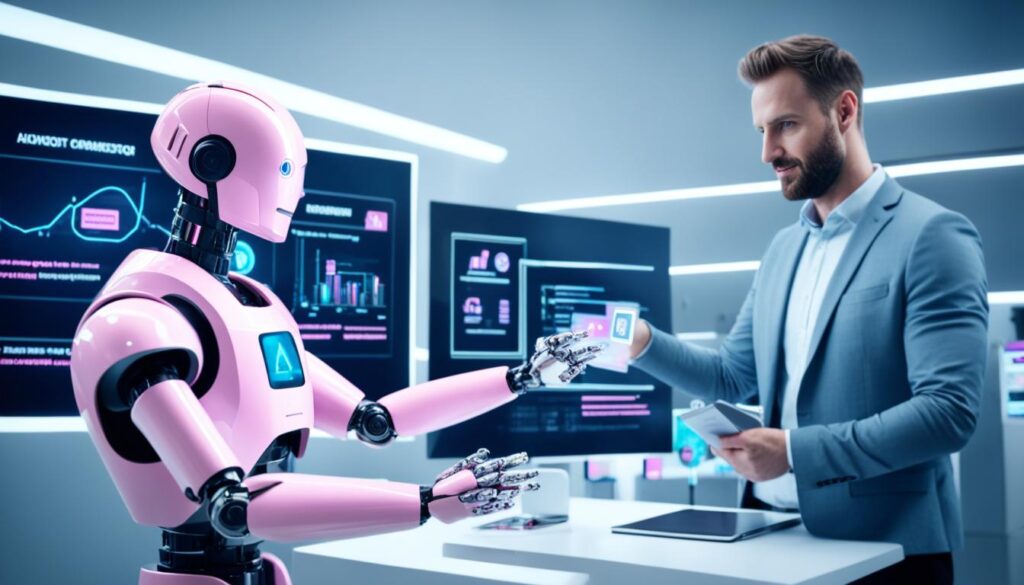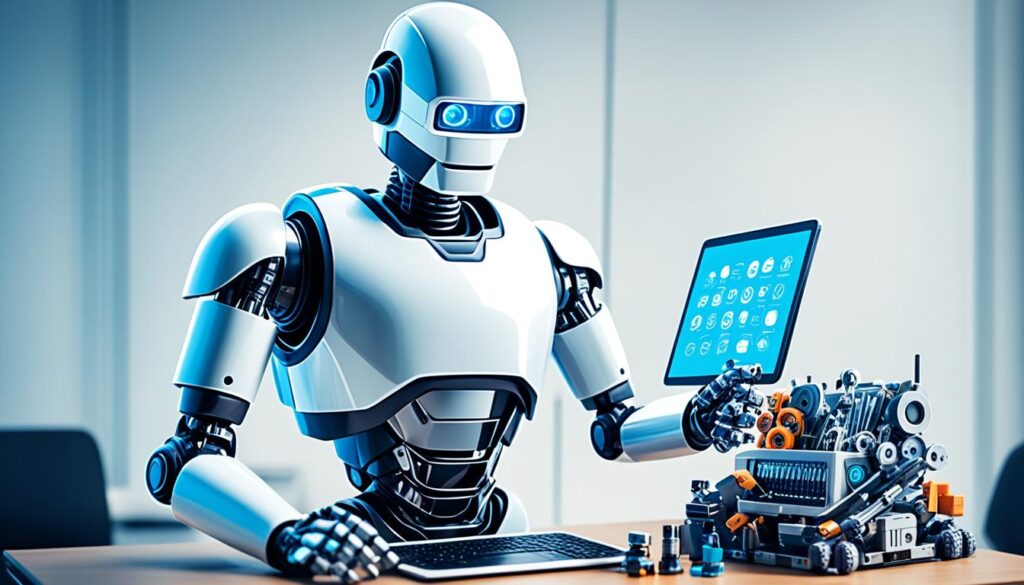“The best way to predict the future is to create it.” – Peter Drucker
The big question is, “will AI take over marketing jobs?” It’s a complex issue. AI is making big strides in some areas but has its limits in others. Right now, half of marketers use AI, and almost 30% plan to start. Yet, things like creativity and feeling can’t be done by AI.
AI is changing the game with tools for analyzing data and coming up with content ideas. For example, WebFX digital marketing uses AI to help out, showing that AI could work alongside humans, not replace them.
Key Takeaways
- AI is on the rise in marketing, with 50% using it and 29% planning to.
- It helps with data analysis, customer support, and making new content.
- Creativity, empathy, and thinking are skills only humans have.
- WebFX digital marketing suggests AI could help, not replace, human marketers.
- Marketers need to learn about AI to stay ahead and effective.
The Current Landscape of Artificial Intelligence in Marketing
AI’s impact on marketing careers is getting bigger as AI technology moves forward. In 2023, the use of AI by the public jumped almost tenfold. This shows how fast AI tools are being adopted in different areas, including marketing. Today, 87% of marketers have tried or are using AI in their work every day. This shows that the AI shake-up in marketing is a big change, not just a passing phase.
Marketing pros are now teaming up with AI. About 63% of marketing leaders are investing in AI or plan to in the next two years. This investment shows how much they rely on AI to get more done and make things run smoother. For example, more than half of these leaders use AI to create content for blogs, websites, social media, and emails. This shows how AI is making it easier to handle big tasks involving content.
Interestingly, 82% of marketers think AI will make a big difference in how much they can do and their financial results. They are excited about how AI can change marketing by automating strategies. AI helps with tasks like summarizing content (for 44% of marketers) and coming up with creative ideas (41%). This lets human marketers concentrate on strategic and creative work.
But, the rise of AI in marketing also brings some worries. For example, 40% of marketers think there will be fewer jobs in marketing and communications because of AI. Also, 22% worry about the impact on team culture. This shows the challenges of getting used to this new tech scene. Even so, while AI is changing the job market, it’s more about changing roles than taking them away completely.
AI is also changing what skills are needed to get into the field. A huge 77% of people said AI has changed what’s expected of marketing interns. Companies are even ready to pay more for interns who know AI, with 71% saying they offer higher salaries. This change in needed skills shows how important it is for everyone in marketing to keep learning and adapting.
Clearly, the link between marketing pros and AI is getting stronger. As AI tools improve, marketers will have to deal with complex issues like data privacy, predictive analytics, and following rules to make sure they’re being fair. Being open about how data is used and having strong privacy policies are key to keeping consumers’ trust.
According to Forbes, “AI aids in creating tailored customer experiences by sorting through vast amounts of customer data to identify significant trends,” reinforcing the view that AI is a tool for enhancing, rather than replacing, human creativity and insight in marketing.
The partnership between humans and AI in marketing is expected to grow more cooperative. Finally, it’s up to marketing pros to use AI tools well while keeping the human touch that makes marketing strategies work.
How AI is Transforming Marketing Tasks
Artificial intelligence is changing the way we tackle marketing tasks, making things faster and more productive. It helps in analyzing data easily, improves how we talk to customers, and makes content creation innovative. The effect of AI in marketing is big and lasting.
Data Collection and Analytics
The use of AI in data analytics lets marketers quickly work through a lot of data. This change makes it easier for marketers to make decisions based on data. A striking 87% of marketers have tried AI tools, with 68% using them daily. This shows how important AI has become for marketing tasks.
Customer Service Automation
AI-powered chatbots are changing customer service. They offer help anytime, without needing a human. This lets teams work on bigger projects. Interestingly, 63% of marketing heads say they’re investing in AI soon, showing its growing value.
Content Ideation and Generation
AI tools like ChatGPT are transforming content creation. Nearly half of marketing leaders use AI for blogs, websites, social media, and emails. These tools make content faster, more relevant, and personalized. Actually, 82% of marketers think AI will boost productivity and innovation.
In summary, AI is making a big impact in marketing. It’s used in data analytics, customer service, and content creation. This focus on AI tools helps us work on strategy and creative solutions, preparing us for a future led by AI.
The Limitations of AI in Replacing Human Marketers
As AI grows, it’s crucial to see its limits, especially in marketing. Understanding these limits helps keep our views on AI’s place in marketing realistic.
Creativity and Critical Thinking
AI has improved automating simple tasks like content curation and ad management. Yet, it falls short in creative strategy. Humans excel in creating new marketing ideas.
AI can’t think of unique campaigns or groundbreaking ads on its own. This proves there’s a gap in AI’s creativity.
Emotional Intelligence and Empathy
AI also lacks in emotional intelligence and empathy. For strong customer bonds, understanding and reacting to their feelings is key.
Marketing needs to touch people emotionally. AI doesn’t have the human touch to truly understand customers.
Ethical and Decision-Making Challenges
Marketing ethically with AI is hard. Human oversight is needed for issues like privacy and bias. These challenges need human judgment, something AI can’t do yet.
AI can’t tackle these ethical issues alone. It takes humans to keep marketing trustworthy.
- Creativity: AI cannot conceive new marketing strategies independently.
- Emotional resonance: AI struggles with building customer relationships.
- Ethics: Human decision-making is crucial to address AI-related biases.
The AI vs human marketer debate will keep changing. But, AI will aid, not replace, marketing roles. Knowing AI’s strengths and weaknesses helps us use it well while keeping marketing’s human side.
Will AI Replace Marketing Jobs?
The debate on marketing jobs and AI often returns to how AI might change things. AI looks promising for automating tasks, changing how we work in marketing. But, it’s not likely to take all our jobs. AI is great at gathering and analyzing data quickly. This brings many advantages to the table.

Right now, half of the marketers use AI in their work. Another 29% plan to start using it soon. Interestingly, 44% are already applying AI for making content and coming up with new ideas. Yet, AI can’t fully understand human feelings. This skill is crucial for creating strong bonds and original concepts.
Many think AI and marketing jobs will work together. AI can handle the repetitive and analytical tasks. This lets us focus on the creative and strategic parts. Still, things like critical thinking, writing with emotion, and forming relationships are beyond AI’s reach.
- Current AI Usage in Marketing
- 50% of professionals use AI today
- 29% planning to use AI
- 44% use AI for content creation
- AI’s Role in Marketing Strategies
- Data collection and analysis
- Automation of mundane tasks
- Limitations of AI
- Understanding human emotions
- Building relationships
- Developing original ideas
The change in the marketing industry prompts us to rethink our roles. AI helps with some tasks, but it also makes us worry about job losses. However, new jobs usually appear to work alongside AI technology. Our skills in creativity and making decisions aimed at humans stay vital. It ensures a future where we work with AI, not get replaced by it.
In conclusion, AI is a tool for improving our marketing methods. By adopting AI carefully, we can use its strengths. At the same time, we keep the human touch that reaches our customers’ hearts and minds. After all, AI can’t match this human aspect yet.
AI-Driven Tools Enhancing Marketing Efficiency
Artificial intelligence is changing our marketing for the better. AI-driven tools boost how we do marketing. They use advanced AI to analyze data and predict outcomes, transforming SEO and PPC management.
AI in Search Engine Optimization (SEO) and PPC
AI’s role in SEO and PPC is truly changing the game. It pinpoints the best keywords and ad times with great accuracy. This means we can use our marketing budgets more effectively and get better results. Tools like Opteo make PPC work easier, cutting down on mistakes and saving precious time.
Social Media Management and Analysis
In social media, AI is also making a big difference. It helps pick and analyze content automatically, helping marketers craft strategies that really connect with people. Take Content Studio, for example. It shows how AI can keep social media efforts sharp and efficient, leaving marketers free to get creative.
The leap forward with AI in marketing isn’t about taking jobs. It’s about making us better at what we do. AI handles the routine stuff and gives us smart insights. This lets marketers achieve more with less work, leading to a better and more dynamic marketing world.
| AI Tool | Function | Impact |
|---|---|---|
| Opteo | PPC Management | PPC automation for enhanced ad timing and targeting |
| Content Studio | Social Media Management | Automated content curation and analysis for higher engagement |
Marketing Jobs Most Vulnerable to AI Displacement
As AI advances in marketing, certain jobs are more at risk. Jobs that rely on data and repetitive tasks are especially vulnerable. Marketing job displacement by AI is noticeable in roles focused on collecting and analyzing data. Because AI can handle data quicker and more efficiently, it’s taking over these marketing tasks.

AI is not just about data. It’s also getting good at making content and images that seem real. Content creation is highly affected. With tools like OpenAI’s GPT-4, Jarvis.ai, and Copy.ai, creating content and images is easier. This puts many marketing jobs at risk. In fact, over 81% of marketers think AI will replace content writers first.
Online customer support is facing changes too. AI chatbots can now talk to customers anytime, giving fast replies and personal suggestions. This shows how vulnerable these jobs are. Yet, jobs that need strategic thinking and creative decisions are safer. Marketers should use AI to help them be more productive without losing their unique human skills.
| Roles | AI Impact | Human Strengths |
|---|---|---|
| Data Analysis | High | Strategic Interpretation |
| Content Creation | Moderate to High | Originality; Creativity |
| Customer Support | Moderate | Empathy; Personal Touch |
| Strategic Planning | Low | Insight; Critical Thinking |
Understanding the impact of AI on marketing jobs is crucial. 30% of workers worldwide worry about AI taking their jobs in three years. Yet, human creativity and empathy can’t be replicated by AI. Even though there’s a risk of automation, AI aims to support, not replace, the creative and empathetic aspects of marketing.
Roles and Skills Essential for Future Marketers
The world of marketing is always changing, and so are the skills for future marketers. AI has changed how we do marketing in big ways. However, certain roles and skills are still very human. It’s key for those looking into a marketing career to develop these skills in an AI world.
Creative Strategy Development
Marketing strategy development needs creativity, something AI can’t match. Coming up with new ideas, creating engaging campaigns, and understanding complex markets are crucial. While half of marketers use AI, having creative skills sets humans apart from machines.
Relationship Building and Human Connection
Making strong connections with clients is something AI can’t do. Even though 44% of marketers use AI for making content, real empathy and clear communication are key. These skills are what makes a marketing team successful.
Advanced Analytical Skills
Even with AI’s help in analyzing data, analytical skills in marketing are still needed. Marketers must make sense of data, find important insights, and use them wisely in their plans. Future marketers should use AI to help, but understanding and strategy need a human touch.
In short, the future of marketing needs a smart mix of skills for future marketers. These include being creative, connecting with people, and analyzing data well. Focusing on these skills will help professionals succeed in a changing industry.
Navigating the AI Revolution: Adapting Strategies and Tools
The AI revolution in marketing is changing the game for marketers. We need to adapt to AI marketing and keep our human skills sharp. Tools like Akkio for data analysis and ChatGPT for generating content are big helps, especially for small teams. Using these technologies keeps us up-to-date and ready to use new marketing strategies.
About 74 percent of business schools now include generative AI in their courses. This shows they know AI is important for future marketing. Schools like Carnegie Mellon’s Tepper and Stanford’s Business School are leaders with their AI programs. Others, like SKEMA in France and Schulich in Canada, have started master’s degrees in AI and data science. They’re getting marketers ready for the AI future.

- Carnegie Mellon University and Stanford University offer programs delving deeply into AI principles.
- SKEMA Business School in France and Schulich School of Business at York University launched master’s programs in AI and data science.
- Minnesota Institute of Technology’s MIT Sloan School of Management incorporates AI into courses like AI for Business Strategy.
It’s clear we need to weave AI into business education. We should create new programs and add AI to current ones. This is key for everyone at work, no matter their age. Boomers and Gen X might feel wary about AI, while younger people are more comfortable using it.
In the larger digital marketing landscape, AI helps us be more agile. It lets us automate daily tasks so we can focus on big plans. AI and marketers working together lead to smarter decisions and tailor-made customer experiences. Succeeding in marketing now means being ready to adapt and change with AI.
The Role of Continuous Learning in Staying Relevant
In today’s fast-changing AI world, keeping up through continuous learning is key for marketing career relevance. As marketers, we need to keep learning to stay on top. Learning new tools and tech helps us know more. It also makes us more adaptable and effective in the field.
A study by the American Society for Training and Development shows a link between learning and profit. Organizations focusing on continuous learning are 21% more profitable. This highlights the need for a lifelong learning culture in today’s AI world. Firms should train their employees on new AI tools to keep up with the competition.
Research by Oliver Wyman points out a mismatch in the skills employees and employers value. We shouldn’t just focus on thinking skills. Skills like creativity, social influence, curiosity, and adaptability are also vital. This approach fits with a continuous learning mindset and helps us adapt to AI-driven changes without being replaced.
The International Monetary Fund believes AI could affect up to 60% of jobs in developed countries. This shows how crucial marketing education is. People good at integrating AI into their work will likely do better in their careers.
To keep up in the marketing career relevance era, embracing lifelong learning is essential. This means diving into new AI technologies and taking advantage of learning opportunities. Nearly 3 in 5 white-collar workers are already using generative AI weekly. Understanding these technologies helps us benefit from AI while keeping our strategic advantage.
| Skill | Importance | Action |
|---|---|---|
| Creativity | High | Focus on innovative projects and seminars |
| Adaptability | Very High | Attend workshops and courses on new AI tools |
| Analytical Thinking | Moderate | Engage in data analysis training programs |
| Social Influence | High | Participate in leadership and team-building exercises |
| Curiosity | Critical | Explore various AI applications through self-learning |
Embracing AI as a Collaborative Tool
The marketing world is changing, and AI is a big reason why. Using AI as a team tool can make our work much better. Now, many companies use AI to do simple tasks, analyze data, and create content. Even though AI is smart, it helps us do our jobs better instead of taking them over.
AI has changed how we give customers a personal touch and reach people all over the world. By using AI chatbots and smart ad targeting, we make each customer feel special. More data means we can make better marketing plans and understand our customers well.
Humans are still needed for their unique skills like understanding feelings, thinking of new ideas, and being creative. These skills help create strong relationships and fresh ideas. To keep up with AI, we need to get better at understanding data, telling stories, and always learning. AI takes care of tasks like putting in data and posting on social media, so we can be more creative and strategic.
At WebFX and other places, combining AI tools with human work makes everything run smoother. AI does the everyday work, letting us focus on the big picture and innovation. Working with AI in a smart and effective way can lead to awesome results. It mixes the best parts of technology and human smarts.



